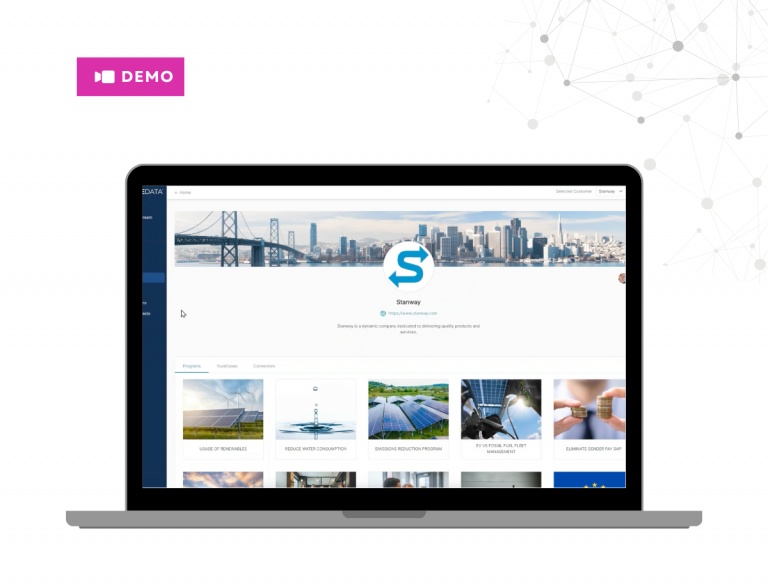Imagine sitting at my desk, deep in the throes of roadmap planning at a leading sustainability software company. It’s a daily balancing act—juggling strategy, customer feedback, technical debt, and the persistent challenge of data integrations.
Now with YuzeData, I’ve enjoyed speaking to several product leaders in the same shoes, but also have the luxury of focusing on connected data technology entirely. From this unique vantage point, I’ve gleaned invaluable insights that are reshaping our approach to sustainability and customer success. Here’s what I’ve learned and why it matters for software providers in the sustainability sector.
1. Seamless Data Integrations—A Game Changer
Customers now demand that providers be more connected into their eco system. But with such a wide variety of these enterprise systems it’s impossible to be an expert on all of them. The depth of requirement has also changed. Where data integration has always been useful to help maintain the software with master data or to export raw data into an external reporting tool, customers now want to do more with data within specific product processes e.g. autocompleting a record or providing aggregate data into an audit trail. This places a daunting burden on your product team of needing to be an expert in multiple types of systems and the type of data they manage before you can even begin to map it to your own product processes.
On top, the extra bandwidth needed to product manage, build and maintain these specific use cases is out of budget for most teams, or handled piecemeal within existing roles. This means it simply falls through the cracks or is left to the customer or their IT partner to figure out as an add on to the product. If delivered as a services customization, then you lose the benefit of adding it as new product capability that can be templated and showcased to easily make it available to other customers.
This is where a library of pre-built connectors with specific sustainability-related activator use cases can really accelerate your journey into providing this added value for customers.
The elegance of YuzeData’s pre-built connector library is something I now see as critical to empowering clients, enabling them to make data-driven decisions with ease and precision. Deploy and configure a template connector that activates a new data feature within a part of your product, have it running for multiple customers within a few hours and best of all it’s handled through the YuzeData platform without impact to the customer, your product or engineering teams. Preserving everyone’s sanity!
2. Sales Conversations don’t have to be a wrestling match
Every interaction with a client is an opportunity to understand their needs and offer real value. It’s about more than just the sale; it’s about building a relationship and offering solutions that truly resonate with their goals. I’ve learned the importance of starting each conversation with the value we can bring to their mission for sustainability.
What if your Sales teams could now say yes to data integrations with confidence with no overhead cost on your team’s time? Wouldn’t it shorten the sales cycle and win more deals? Would your sales teams consider you their best friend?
A marketplace showcasing connectors and focused on your target market does just that; it’s a great selling tool for your commercial teams plus it educates customers on the additional value you can bring them by leveraging data more easily across the tools they use today. Even better is the opportunity to drive new revenue or upsell from those conversations.
3. Zero Maintenance heaven!
Not just the integrations themselves but also their maintenance are normally a nightmare for engineering teams, but it really doesn’t have to be this way. Integrations and their APIs can break for a whole host of reasons, it’s a simple fact. E.g. their end points need to be maintained, data returned is not in the expected format, a source system may have been updated but not yet the API and so on.
Liberating your technical teams from the upgrade cycles on versions of integrations allows them to instead dedicate more time to innovation and strategy. This shift is one I celebrate, as it enhances our capacity to be proactive and responsive to emerging needs.
With YuzeData taking care of this maintenance in the background, engineers can spend their time on building for customer value, instead of being on call for integrations or firefighting customer escalations. Seamless data connectivity isn’t just a feature; it’s the lifeblood of client operations and part of a total service you can now offer to customers, with the same service level expectations as your own product.
4. Access to Data Drives Innovation
Product teams have always known that data intelligence is an opportunity; when access to customer data is no longer a barrier and when it’s easy to use it in sync with your product, it elevates your product innovation to help customers work smarter. It could be combining data sources with your own product data for new AI features, driving automated action that gets stuff done immediately in other systems without having to wait for month-end team dashboard reviews or ensuring your product is at the center of the customer’s world by effectively becoming a platform component through real time integration. The YuzeData platform comes with an extensible plug-in engine, that offers your innovation teams an environment to experiment in, build new connectors and use cases and deploy automated action to easily expand your product capability transforming outcomes for sustainability customers.
5. Competitive Advantage
From what I’ve seen, usage analytics tend to focus on customers, segments, personas, and usage of the main product pages and features only. With a data platform powering interactions with the customer ecosystem, you as a software provider can now start understanding data usage in more detail. Which systems does the customer rely on most, where are the highest frequency interactions, which departments do they automate action to most often? Instead of spending precious resource on technical development, your product and marketing teams can now make the most of this intelligence at their fingertips; understanding your customers in a lot more detail really helps when it comes to building for an adjacency that you have struggled to get real buyer intent data on in the past.
Customer success teams will also feel the benefit of improved service levels around integrations; clients who don’t have to spend over the odds for integrations, or deal with constant data integration issues, are generally happier clients with improved customer satisfaction scores. Nothing speaks louder to your business, and CEO, than happy customers!
On a personal note, I look forward to this new era where openness and connectivity become the norm for sustainability customers; and where software product teams can have a more stress-free approach to roadmap planning without the usual headaches!







